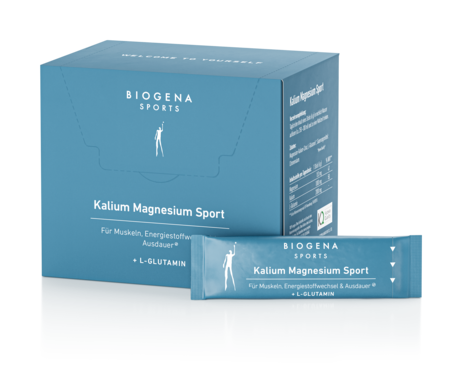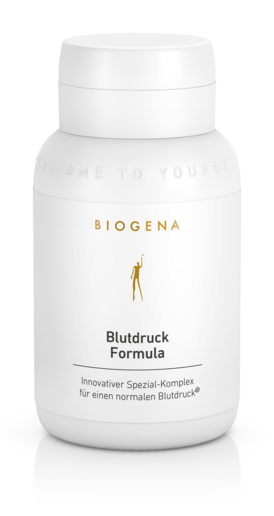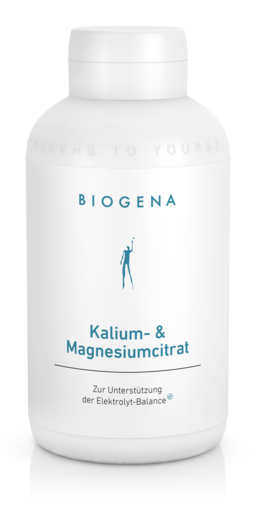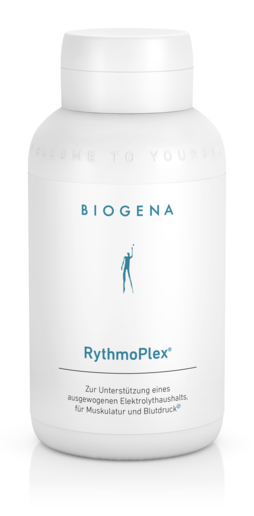Potassium
Potassium is an important mineral and electrolyte that the body needs for various processes. As potassium cannot be produced by the body itself, it is important to obtain sufficient potassium from food or - if the requirement cannot be met - from dietary supplements.


The positive ion with many tasks
Potassium is an important electrolyte for the human body and is familiar to many athletes: the potassium-rich banana after a running or cycling session has been a symbol of optimal sports nutrition for decades and is often part of the fixed repertoire of amateur athletes. The following explains how to ensure a good supply, how high the requirement is and what possible consequences a deficiency can have.
Potassium – important for numerous body functions and your health
Potassium is an essential bulk element in the body. It is one of the most important electrolytes. The majority is located within the body and the muscle cells. In contrast, there is relatively little in the cells of the liver, bones, and red blood cells. Potassium fulfills many important tasks in the body.
-
It ensures energy metabolism as well as the water and acid-base balance
Potassium is required for energy production and, together with sodium, can help to regulate the water and acid-base balance.
-
Blood pressure and heart and muscle function
Potassium supports the maintenance of optimal heart and muscle function and regulates blood pressure.
-
Function of nerves
Potassium is important for the nerve cells because without the mineral, stimulated nerve cells cannot return to a resting state. An optimal potassium balance contributes to the strengthening of nerves. A frail mind that is susceptible to stress consumes a lot of potassium to achieve a resting state. Adequate intake must be ensured here.
How does a potassium deficiency develop?
Normally, the body is well supplied with the mineral through a balanced diet. If there is a deficiency, the potassium balance should be stabilized as quickly as possible. Diabetics who inject insulin also have an increased need, since insulin ensures that the potassium is transported increasingly to the body cells. This means that it may be missing in the blood so potassium intake should be consciously addressed. If you take diuretics (tablets for water retention) and laxatives over the long term, you may also suffer from a potassium deficiency. Other risk factors are:
- Heavy sweating
- Stress
- High alcohol consumption
- Extreme salt intake, since potassium, is the counterpart of sodium
- Malnutrition due to unbalanced diets or eating disorders such as anorexia or bulimia
- Insufficient fluid intake, which is a common problem, especially in elderly people
It is also important to keep an eye on the electrolyte balance in these cases.
Avoid potassium deficiency
The German Nutrition Society (DGE) states a reference value of 4000 mg per day. However, it is often higher under various conditions, such as high blood pressure and the aforementioned risk factors. The mineral enters the body via the food and is excreted via the kidneys. The body's hormones, such as glucocorticoids, regulate the potassium balance. However, the question remains as to how it is possible to compensate for a potassium deficiency. A change in diet with potassium-rich foods can provide the answer.
Potassium-rich foods not only supply the body with potassium but also many other valuable nutrients. Anyone who integrates them into their menu regularly does not normally have to worry about a deficit. However, it should be noted that potassium is lost to a large extent when preparing food, for example by cooking. If it is not possible to meet the need, it is recommended that high-quality nutritional supplements should be used to supply the mineral. In a healthy state, the body excretes the mineral through the kidneys. If these are damaged, the decomposition process no longer operates as desired; therefore, an unplanned supply of potassium should be avoided.
The following foods contain plenty of potassium:
Green vegetables such as kale, broccoli and spinach
Potatoes
Legumes such as lentils and soybeans
Cereal products
Wholemeal bread
Various types of fruit such as banana, honeydew melon and blackcurrants
Mushrooms such as chanterelles
Dairy products
Oat flakes
Cocoa bean and bitter chocolate
Nuts
Summary
Potassium is a very important component of all our cells. For example, it regulates the fluid content and also has many other metabolic tasks such as controlling contractions in the muscles. It is important to ensure that we are supplied with enough through our food. Potassium is particularly abundant in plant-based foods. Despite a balanced diet, however, there are risk groups in which the potassium balance is often too low. In this case, the intake of dietary supplements may be useful to prevent a deficiency.













